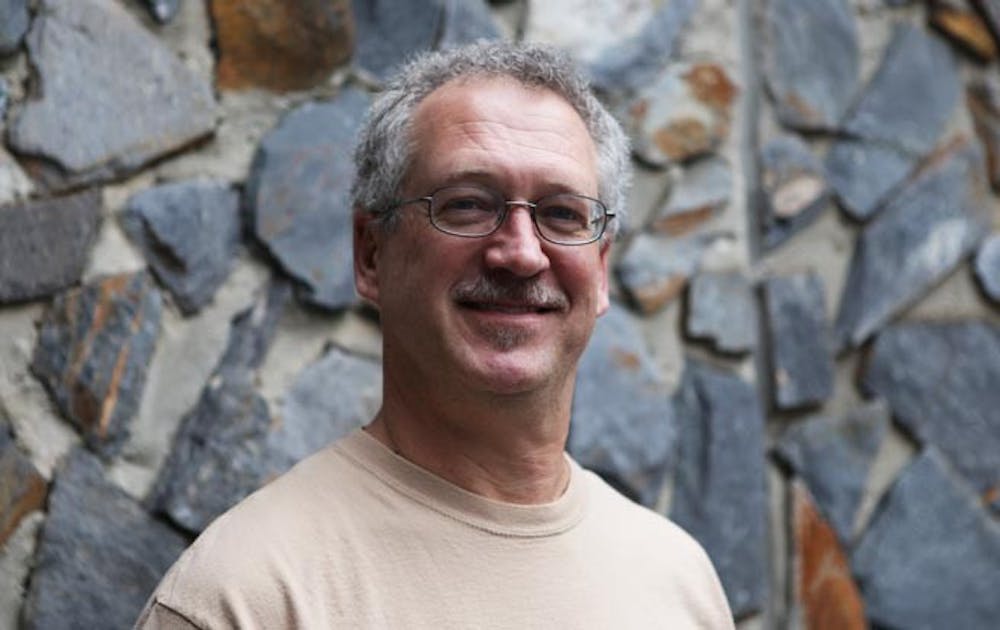Entering into the mind of local artist Tom Whiteside—who presents his works under the name Durham Cinematheque—is akin to entering into a living repository of cinematic knowledge. Recess writer Derek Saffe had the chance to interview Whiteside and discuss his life as a filmmaker and his current exhibit at the Durham Cinematheque.
R: Why and when did you start the Durham Cinematheque?
TW: Cinematheque has been around since ‘91, and in its current space for just a year and a half. I have been showing films pretty steadily ever since I finished college in ’79. A year and a half ago I got a permanent space in the Durham Arts Council Building, [before] everything else was in my basement. Now I have a public space and I can do projection for 10-12 people.
R: What work were you involved in before the Durham Cinematheque?
TW: I was a visiting artist in the North Atlantic Community College system for four years, which was a real boost to me as an artist. I got that job five years out of college and it was only for 4 years but I was a full-time professional experimental filmmaker. That was very important to me early on as a filmmaker and was the foundation for a lot of what I was and currently am doing today. Then I started raising kids and I couldn’t do as many screenings, but then when they moved away I started having more time. I’m the classic mid-career artist; I don’t have to search for what I want.
R: What is your opinion on the arts culture at Duke?
TW: Certainly in the last six to eight years the arts culture on campus has changed a lot and for the better. The Nasher has made a big difference, specifically for students. A lot of college students are concerned about their careers and jobs after college, which is understandable, but also one of the things that you do in college is that you discover the world in a very big way. You’re making your own place in the world. I think that art museums, music concerts and dance performances are very important culturally.
R: What directors/filmmakers have influenced your work?
TW: I got interested in film as a sophomore in college and I saw Stan Brakhage come to town and I think I saw him do three programs in four days. I was always interested in the films that were made in the early days of cinema and those works hold a big fascination for me. I also have a very strong affinity for Hollis Frampton, both for his films and writings. Sometimes I will be reading him and he would explain a concept that I was thinking but could not explain myself because he’s more articulate than I am.
R: Could you please discuss your current exhibit?
TW: My current exhibit is called One Hundred Years of Image Machines, from magic lanterns to Pola-vision, 1880s to the 1980s. It’s a lot of cameras, projectors, editing gear and other ephemera. [In] the last ten years, when I give film programs, I realized that a lot of people want[ed] to check out the film projector and geek out on it because they hadn’t seen one in ages, since high school. For most people images are on their phone, on their screen. They’re not projected through space or through an incandescent lamp and they’re not mechanical. I have a hand-cranked film projector and pair of tickets to a 19th-century Edison film program called “The War-o-scope.” The exhibit will be up for six months and each month there will be a different focus. This month is an overview; in January we will focus on magic lanterns and then in February we will be showing outtakes from a film called Multiple Sidosis. And then we will finish in May with two locally made films: Tobacco Land USA and Negro Durham Marches On.
R: Any future plans?
TW: Well, for the past four or five years I have been doing multi-screen programs that use archival material with two or three projectors. This brings back a certain spectacle that you don’t get in many other ways. I will be also be doing a piece at the Strange Beauty film festival held at the Manbites Dog theater with a live band called Arrows Out. I am interested in more elaborate, more theatrical presentations of images. I would also like to do more in Durham with more local Durham films, but I just need to get more people involved.
One Hundred Years of Image Machines will open at Durham Cinematheque, located at 305 E. Chapel Hill Street, on Monday, December 10 and will run through May 2013.
Get The Chronicle straight to your inbox
Signup for our weekly newsletter. Cancel at any time.

